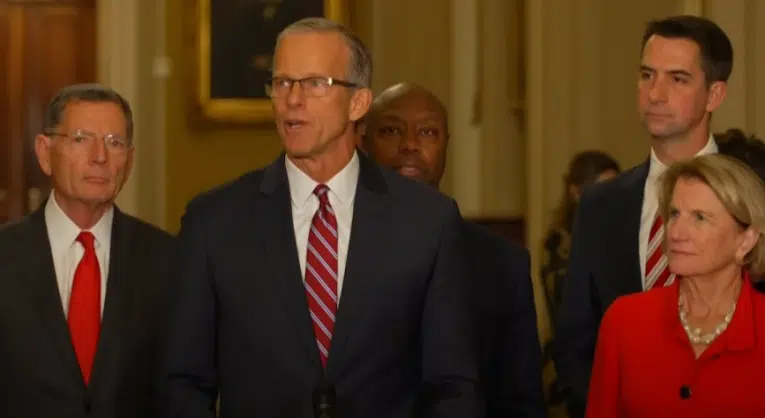Below is a letter that was sent from ALG President Bill Wilson to Senator’s Mitch McConnell and Orrin Hatch in support of the balanced budget amendment:

Senate Minority Leader Mitch McConnell
361-A Russell Senate Office Building
Washington, D.C. 20510
Senator Orrin Hatch
104 Hart Office Building
Washington, D.C. 20510
Dear Leader McConnell and Senator Hatch:
As you are well aware, the nation is risking a fiscal calamity that threatens a catastrophic default on the $14.2 trillion national debt and the collapse of the dollar as the world’s reserve currency. If something is not done to bring the nation’s fiscal house into order, soon the debt will become too large to even refinance, let alone be repaid.
That is why Americans for Limited Government strongly endorses the Senate Republican Balanced Budget Amendment and urges all members of the Senate to fight for its immediate adoption. Soon the gross national debt will become larger than the entire economy, and by 2021, the Office of Management and Budget projects it will soar to over $25 trillion[1].
Interest payments alone threaten to destabilize the nation’s finances very soon. In 2010, the Treasury paid a total of $413 billion in interest[2], including $216 billion to the Social Security and Medicare trust funds. The total interest is a real obligation that requires real borrowing to meet, and cannot be readily discounted as revenue to the entitlement programs when it is in fact a liability to taxpayers.
The total interest owed on the debt will actually be over $1.2 trillion in 2021. And since the government never anticipates the debt being paid down, the number will easily grow to over $2.4 trillion by 2030. Moody’s has warned that when interest owed on the debt reaches 18 to 20 percent of revenue, the nation’s gold-plated Triple-A credit rating will be downgraded[3]. The trouble is that the Office of Management and Budget projects total interest owed for 2011 to be $430.4 billion, which is already 19.79 percent of the projected $2.174 trillion of revenue. That means time has already run out.
Currently, the $14.2 trillion national debt already stands at 95.5 percent of the nation’s $14.8 trillion Gross Domestic Product (GDP). While it is unclear at what percentage of debt-to-GDP that the debt will become too large to refinance, the warning signs are already there that we cannot even meet our current obligations honestly.
Pimco reports that in 2009, 80 percent of treasuries were purchased by the Federal Reserve[4], and in 2010, it had to buy 70 percent[5], bringing its current U.S. debt holdings to $1.3 trillion[6]. As a result, the Fed is the largest lender to the U.S. government in the world — all with printed money — more than China or Japan[7]. When the Fed ends QE2 in June, it will likely keep a high water mark of $1.5 trillion in treasuries holdings.
Printing money to refinance the debt cannot continue for long without very severe consequences, including a potential collapse of the dollar as the world’s reserve currency, hyperinflation, and a complete default on the nation’s obligations. The time to pass the Balanced Budget Amendment is now, before it is too late and it becomes impossible for the debt to ever be repaid.
The Balanced Budget Amendment being proposed, once implemented, will make it possible that for the first time since 1957[8], the national debt can be reduced. This must begin to occur to reassure the nation’s creditors that the U.S. intends to honor its obligations with real money, not with a “pretended payment”[9] that economist Adam Smith warned against.
With the upcoming vote on increasing the national debt ceiling above $14.294 trillion, now is the opportunity to use your leverage not just to get an up-or-down vote on the Balanced Budget Amendment, but to get it adopted. To do so, we urge you to take your case directly to the American people, who will join with you in fighting to make certain that another increase in the debt will never again be necessary.
The American people must be advised of these cataclysmic risks of inaction. There is a very dangerous misconception that the nation can just continue borrowing and printing money perpetually. It cannot. Nor will it long endure as the world’s foremost economic and military superpower if it tries to.
Besides a failure to meet our fiscal obligations, a national default will mean that the U.S. will be unable to meet its security obligations around the world, destabilizing whole regions, and threatening national security. It is likely for this reason that Chairman of the Joint Chiefs of Staff, Admiral Mike Mullen, described the debt as the number one danger facing America[10].
With a projected $1.645 trillion budget deficit for this year alone, the hour grows late for real action to rein in the federal government’s unsustainable spending binge. It is clear that Congress lacks the political will to do what is necessary on its own. It needs the constitutional limits on spending, taxation, and the balanced budget requirement outlined in your amendment to compel it to act prudently when handling the American people’s finances.
We thank you for your work on this critical issue, and urge you to use all the tools at your disposal, including the leverage of increasing the national debt ceiling, to ensure speedy adoption of the Balanced Budget Amendment. If you will take a courageous stand to save this nation from certain ruin, the American people will surely stand with you.
Sincerely,
William Wilson
President
Americans for Limited Government
CC: Members of the U.S. Senate
[1] http://www.whitehouse.gov/sites/default/files/omb/budget/fy2012/assets/tables.pdf
[2] http://www.whitehouse.gov/sites/default/files/omb/budget/fy2012/assets/hist08z5.xls
[3] http://www.investors.com/NewsAndAnalysis/Article.aspx?id=532490
[4] http://www.youtube.com/watch?v=VmTXxsn7g1Y
[5] http://blogs.reuters.com/felix-salmon/2011/03/02/when-bonds-lose-their-bid/
[6] http://www.federalreserve.gov/releases/h41/Current/
[7] http://www.treasury.gov/resource-center/data-chart-center/tic/Documents/mfh.txt
[8] http://www.treasurydirect.gov/govt/reports/pd/histdebt/histdebt_histo4.htm
[9] http://blog.getliberty.org/default.asp?display=2032
[10] http://www.defense.gov/news/newsarticle.aspx?id=60621






